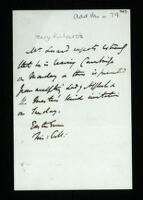Trinity College, Cambridge.—Sends some lithographed notes on analytical geometry. Has been told that they cannot become Masters of Arts till next term. Jokes about Pollock's hat, and refers to Auerbach’s Spinoza, the new edition of Shelley, and Sidgwick's interpretation of one of Myers's poems.
(Marked 'Jan. 1870'.)
—————
Transcript
Trin. Coll. Camb.
Tuesday.
Dear Fred
My lithographed notes were on analytical geometry, and they only got as far as the logical foundations of the algebra thereof; howbeit the first two I send you. We cannot become MM.A. (had you there, I think) till next Term, teste Luard, who ought to know {1}—and who apparently thought I ought to know, for he nearly went into a fit at my ignorance, and spoke in a tone which implied that the eastertermness of first masterhood was at least a synthetic judgment a priori. Don’t know Grote. {2} In regard to your shiny hat (otherwhence described to me as a bright and beautiful object) I wish to observe
1ᵒ. That a habit is to be broken because it is an external circumstance which interferes with my liberty.
2ᵒ. That nevertheless habit-breaking is a virtuous action or a sin according as it proceeds from my internal activity or from the action of circumstances yet more external than the habit.
3ᵒ. That I do things not because society is ripe for being improved by becoming more like me (and I am so nice!) but because I darn choose, confound you!
4ᵒ That nobody is bound on my principles or on any thing else; because Freedom is All.
5ᵒ That you had better sit on it.
Is Auerbach’s Spinoza {3} all about Clara Maria van der Ende? I think she must have been an interesting person. I have gotten the new Shelley, than which I am sure a more detestable book {4}
Yours truly (I mean gruly; it’s put in for the rhyme—I am suffering from heartburn. Sidgwick says that in Myers’ poem the figure of Faith as Our Lady is only realistic and does not mean anything—what do you think? {5}
—————
Written in purple ink.
{1} Luard was the University registrary.
{2} Probably either John Grote, a Fellow of Trinity, formerly Professor of Moral Philosophy, or George Grote, the historian and politician. The latter’s Aristotle is mentioned in CLIF A4/3.
{3} Presumably Berthold Auerbach’s novel Spinoza, first published in German in 1837, though his translation of Spinoza’s works, published in 1841, also contains a ‘life’.
{4} The reference may be to the revised edition of the poet’s poetical works edited by Mary Shelley, published by Edward Moxon, Son, & Co. in 1869.
{5} The reference appears to be to F. W. H. Myers’ poem ‘The Translation of Faith’, published in Poems (London and Cambridge: Macmillan & Co., 1870). Cf. the following lines:
From where she lay the very Faith arose;
She stood as never she shall stand again,
And for an instant manifest to men:—
In figure like the Mother-maid who sees
The deepest heart of hidden mysteries
The poem is dated at Rome, 7 January 1870, but the preliminary note to the volume is dated March 1870, which would appear to indicate that the date marked on the letter is wrong. However, it may be that Clifford, Sidgwick, and Pollock saw the poem before it was published, or the allusion might be to a different poem.
